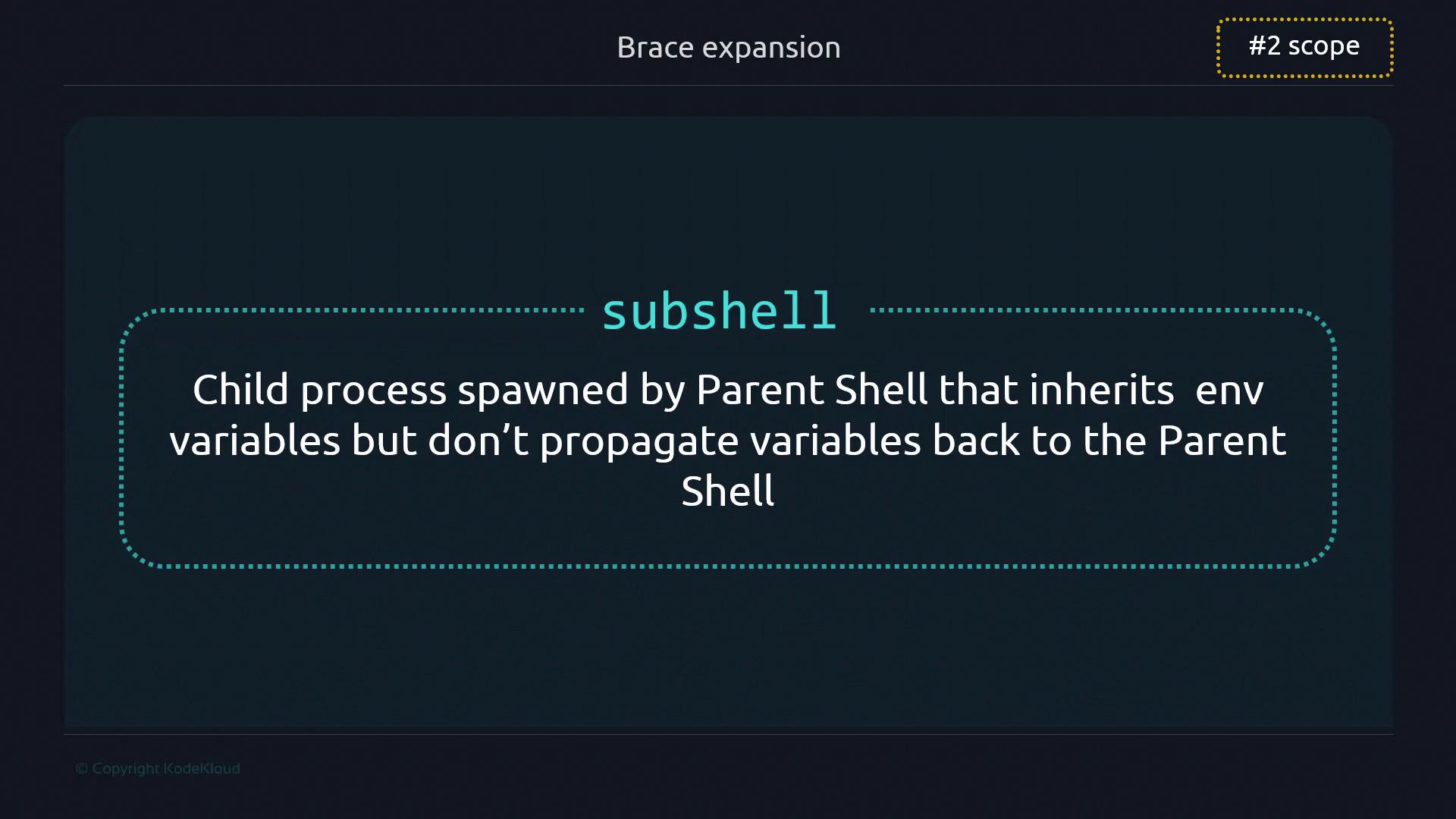Advanced Bash Scripting
Expansions Part Two
Command Substitution
Command substitution is a fundamental feature of Bash scripting that lets you capture the output of one command and embed it into another. This technique improves script readability and enables dynamic data handling in your shell scripts.
Recap: Variable Expansion
Use $ followed by a variable name to expand its value. Enclose the name in curly braces {} to avoid ambiguity, and wrap expansions in quotes to prevent word splitting and globbing.
name="John"
echo "${name}"
# Output: John
Tip
Always quote your variable expansions ("${var}") to preserve whitespace and avoid unexpected globbing.
What Is Command Substitution?
Command substitution runs a command in a subshell and replaces the command with its standard output. There are two syntaxes:
| Syntax | Description |
|---|---|
$( ... ) | Preferred form; allows nesting easily. |
`...` | Deprecated; harder to read and nest. |
Example: Counting Files on the Command Line
$ ls
DEV001 DEV002 DEV003 DEV004 MKT001 MKT002 MKT003 MKT004 command-substitution.sh
$ find . -type f | wc -l
9
Using $( ... )
Create command-substitution.sh:
#!/usr/bin/env bash
file_count=$(find . -type f | wc -l)
echo "Total files: ${file_count}"
Run it:
$ chmod +x command-substitution.sh
$ ./command-substitution.sh
Total files: 9
Using Backticks (Deprecated)
#!/usr/bin/env bash
file_count=`find . -type f | wc -l`
echo "Total files: ${file_count}"
Warning
Backticks are deprecated. They complicate nesting and reduce readability. Always prefer $( ... ) in modern Bash scripts.
Accepting a Directory Argument
Require the user to specify a target directory:
#!/usr/bin/env bash
if [[ -z "${1}" ]]; then
echo "Usage: $0 <directory>"
exit 1
fi
file_count=$(find "${1}" -type f | wc -l)
echo "Files in ${1}: ${file_count}"
$ ./command-substitution-v2.sh .
Files in .: 9
Timing Considerations
Command substitution runs once when assigned. If you modify files later, the stored value stays unchanged until you reassign it.
#!/usr/bin/env bash
if [[ -z "${1}" ]]; then
echo "Usage: $0 <directory>"
exit 1
fi
file_count=$(find "${1}" -type f | wc -l)
echo "Initial count: ${file_count}"
touch samplefile
echo "After touch: ${file_count}"
$ ./command-substitution-v3.sh .
Initial count: 9
After touch: 9
Re-running the script updates the count:
$ ./command-substitution-v3.sh .
Initial count: 10
After touch: 10
Subshell Scope
Command substitution executes in a subshell. Variables modified inside do not affect the parent shell:
#!/usr/bin/env bash
if [[ -z "${1}" ]]; then
echo "Usage: $0 <directory>"
exit 1
fi
dir=${1}
file_count=$(find "${dir}" -type f | wc -l)
sub_output=$(
dir="/some/other/dir"
echo "Dir in subshell: ${dir}"
)
echo "Dir in parent shell: ${dir}"
echo "${sub_output}"
$ ./command-substitution-v4.sh /usr/bin
Dir in parent shell: /usr/bin
Dir in subshell: /some/other/dir

A subshell inherits your environment but keeps its changes local.
Performance Considerations
Each command substitution spawns a new process. In most scripts this overhead is negligible, but in performance-critical loops, minimize unnecessary substitutions.
Performance Warning
Avoid placing heavy command substitutions inside tight loops. Consider alternatives like readarray or built-in string operations when processing large datasets.
Honorable Mentions
| Use Case | Example |
|---|---|
Capture stderr | files=$(ls -j 2>&1) |
| Capture timestamp | current_date=$(date) |
echo "Errors: ${files}"
echo "Today's date: ${current_date}"
Links and References
Watch Video
Watch video content